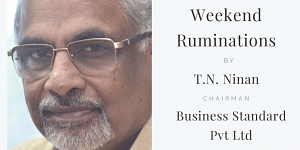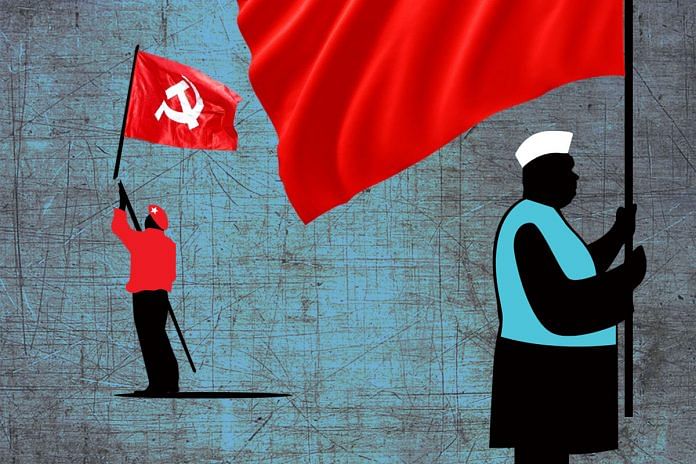If the two principal parties have turned away from the “neo-liberal” agenda, they must agree the electorate isn’t interested in those ideas.
Obituaries have been written for the Left in the days following the Tripura vote-counting. Some of them regretfully, others with schadenfreude that the communists have only got what they deserved. Few have pointed out what an observant former newspaper editor did, privately, that the communists have become irrelevant because the entire political spectrum has become Left — only, a less ideological Left.
Certainly, the Bharatiya Janata Party (BJP) has moved leftward under Narendra Modi. A solitary barb — “suit-boot sarkar” — has condemned the agenda for structural change to the back burner, if it ever was intended for the front burner, which is a matter of debate. Reform of the markets for land, labour and capital are not part of active debate. What Mr Modi prefers in their place is to announce spending programmes of one kind or another, and to reverse a quarter-century of tariff cuts — immediately after criticising protectionism from a Davos pulpit. The scope for government intervention in agricultural markets is being steadily expanded in the face of farmer distress, as though no other policy response is feasible. Most telling is the silence on the ownership question, even when it comes to the most mismanaged banks that are costing the taxpayer unconscionable sums.
To be sure there are the occasional steps to undo what Indira Gandhi did in 1969-73, but these are all too few: such as the de-nationalisation of coal. No one mentions what should be at the top of any liberal agenda, and in every list for improving the “ease of doing business”: constraining the arbitrary use of state power, which the original Mrs Gandhi institutionalised. What, our rulers seem to ask, is the point of capturing power if you can’t play with a “caged parrot”, or set off a tax hare?
 As for the Congress, once the “party of economic reform”, its attack on the government is invariably from the Left corner, which is where its rank and file has always been most comfortable. Rahul Gandhi may have worked for a consultancy in London, tried his hand at running a business or two, and bought (or “borrowed”) the odd Burberry, but his political postures suggest that he is his mother’s rather than his father’s political inheritor.
As for the Congress, once the “party of economic reform”, its attack on the government is invariably from the Left corner, which is where its rank and file has always been most comfortable. Rahul Gandhi may have worked for a consultancy in London, tried his hand at running a business or two, and bought (or “borrowed”) the odd Burberry, but his political postures suggest that he is his mother’s rather than his father’s political inheritor.
If the two principal parties have turned away from the “neo-liberal” agenda, so called, they must be in agreement that the electorate is interested in anything but those ideas. And who is to say they are wrong? One only has to look at the populist impulse that spurs newbie hopefuls like Rajinikanth and Kamal Haasan, to see where they think the votes lie. It is no different with existing regional political operators, all of whom have their fiscal focus on giveaways of one kind or other. That such populism is required only because of the pressures created by the failure to reform markets, is not a thought that gets purchase.
So why should anyone care about the interminable wrangling by Prakash Karat and Sitaram Yechury? Their squabbles have become personal and factional, and have little to do with the (no-longer-hoped-for) victory of the proletariat. Whatever good the early communist governments did during the 1970s in Kerala and West Bengal, latter-day strength came from wielding muscle-power and from diverting state resources into party channels or through party apparatchiks. West Bengal became the locale for the country’s most violent electoral contests; now it is the turn of Malabar. Note also that, however, much one may criticise the Sangh Parivar’s “deep state” for its determined experiments at thought control on history and culture, and for its peculiar understanding of secularism, it has not yet imitated the communists who had made party membership a virtual condition for a college lecturer’s job in West Bengal.
So the communist Left is at its lowest ebb in more than half a century, but the broader Left is more entrenched than ever in Indian politics. Bogus ideological purity has lost its appeal, even as people have settled into a familiar comfort zone: Indira Gandhi’s Leftism of 1969-73, with its mix of state capitalism and populism.
By special arrangement with Business Standard




The author seems to have deliberately overlooked the successes the Left govt. achieved in the 3 states it ruled for decades starting from literacy programmes, land reforms and expanding the agrarian productivity achieved never before in India.The business-friendly nature of the present govt. now as it seems have failed with CEO deaths becoming routine and also India being pushed to even lower ranks in terms of hunger, child nutrition and deaths…So neither are they serving the people nor the corporates…The author is in a similar mess as is this Modi govt.
The desire for leftism comes because for decades Congress has successfully sold the concept of a Maa Baap state. It is comforting for many, not to work too hard and keep adjusting all your life. The fact that being a chaiwala or a pakora vendor is as honest a profession as a government clerk, is lost on many. Look at the jibes from Mani Shankar Iyer and P Chidambaram to understand it.
What economic philosophy the Congress practised is of no relevance to Indians who gave a decisive mandate to the current Government. It was a vote for change – a change of how the state conducts its policies – mostly economic policy. H0w would you describe your party’s economic philosophy today subhasis? As a blend of the Congress and the Left isnt it. Where is the originality?
It seems nobody is able to assess the performance present Govt. if Narendra Mody without juxtaposing the failures of previous Governments and this case the Govt. if Indira Gandhi of 1970s. I do not understand whether it is to criticise the previous Govts. or to provide comfort to present rulers.When will this sort of journalism will end?.
Mr Rahul Gandhi comes across well when he speaks to foreign audiences, sometimes Indians living or studying abroad. He speaks feelingly about India’s ethos of tolerance, pluralism and a liberal democracy. However, he is slender on details about how he would address economic challenges, starting with job creation. Some platitudes about SMEs, etc. He cannot be unaware that, beyond the scandals and loss of self confidence that marked the last three years of UPA II, there was high inflation and the loss of momentum post 2008, covered up for a while by the sugar high of a fiscal and monetary stimulus. The bad loan problem his party’s government left behind was not only about inappropriate phone calls from Delhi. Projects were getting stranded because they were becoming unviable. He might wish to value his father’s modernising vision and update his economic orthodoxy.
Few will mourn the demise of the Left, although they have produced some fine parliamentarians and their concern for the poor cannot be discounted at a time when inequality is increasing in India even more sharply than in the rest of the world. 2. The reluctance to move away from Mrs Gandhi’s brand of socialism, after seeing how well the reforms of 1991 have acquitted themselves, is most unfortunate. Absent the consistently higher, sustainable growth that can come only from continuing reform, it is unsurprising that so few incumbents in Delhi win a second term.